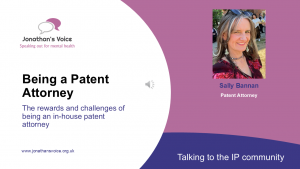Jonathan’s close friend Dave Horsfall writes,
“Jon and I met at university and lived together in Leeds after we graduated. It was a great personal shock when he died, but I’ve subsequently tried to reflect on my own mental health and to advocate for a mental healthy workplace. I’ve recently started a new role as a research software engineer at Newcastle University, and have embarked on a series of blog posts discussing mental health in academia – with a particular emphasis on software engineers and similar technical roles. The COVID-19 pandemic has resulted in abrupt changes to routine, and the swift adoption of remote working. These changes present unique challenges for people who may never have experienced behaviour associated with mental illness in the past. I myself have experienced an increase in anxiety and drop in confidence since lockdown restrictions started. Open dialogue is now very important to remove the stigma associated with mental health.”
Staying healthy as a research software engineer
In October 2017, a close friend died by suicide. It was completely unexpected. As I grappled with my own personal grief afterwards, it became clear that Jon was under immense pressure at work, but didn’t feel able to reach out for help with problems of anxiety.
In a series of blog posts I will explore my personal journey of small steps to firstly recognise and improve my own mental health, but also to encourage open dialogue about these issues within the wider software engineering profession.
I started a new RSE role at Newcastle University on 30th March, just a few days after the government imposed a range of severe lockdown restrictions. Many workers have made a rapid switch to working from home for the first time, and now find themselves away from their routine, increasingly isolated and juggling other commitments. The mental health challenges caused by the pandemic are really significant, but simple measures within a team can have a positive impact on wellbeing.
Uncovering a mental health crisis in Britain’s workplace
In 2017 the government-commissioned Thriving at Work report uncovered a crisis in Britain’s workplace. People with mental health problems still feel stigmatised, and are not getting the support they need. Meanwhile many employers remain unsure as to how to provide adequate support, and are collectively losing billions as a result. Just 13% of employees would be comfortable talking about mental illness at work and even though stress, anxiety and depression are particularly common — with one in six workers experiencing one at any one time — there is still a huge stigma attached to it, that prevents people from asking for help, or even just talking about their mental health.
The state of mental health amongst academic staff received increased media coverage last year, with many highlighting a steep increase in referrals to counselling. In February 2018, it was reported that 43% of academic staff exhibited symptoms of at least a mild mental disorder. This is nearly twice the prevalence of mental disorders compared with the general population. Primarily to blame are the increased workloads of academics and demands to publish and obtain external revenue. High levels of poor mental health have a profound impact on the professional competence and productivity of academics, affecting administrative, teaching and research quality — as well as impairing communication and work relationships among staff. Of course, poor mental health also affects the personal lives of these individuals.
It has been over 15 years since I last worked in academia and I’ve found myself returning under exceptional circumstances within a global pandemic. The Research Software Engineering team and leadership at Newcastle has been outstanding. The university has embarked on a proactive initiative of wellness advocacy, which will be explored further in this series.
Code, sleep, burnout and repeat
The mental health landscape for software engineers is different for each of us, we are all unique. Whilst we might deal with our challenges differently, software developers have a considerably higher chance of experiencing fatigue, burnout, anxiety, and stress, compared to their colleagues who perform mechanical tasks. As a young developer, I certainly pushed myself too hard. I spent long hours in front of my screen and would drive myself to burnout. At the time I had little self-awareness about this however, I’m now much better at identifying the early signs and taking preventative steps. I’ve also taken proactive career steps to ensure that I work for a compassionate and supportive employer. I would argue that your employers attitude to mental health is one of the most important factors on personal wellbeing, and should be a major consideration when seeking employment.
This blog was originally published by Dave Horsfall at https://medium.com/newcastle-university-research-software-engineering/mental-health-for-research-software-engineers-in-academia-2a5f0274f16e where it can be read in full along with a series: “Mental health for software developers in academia”.









